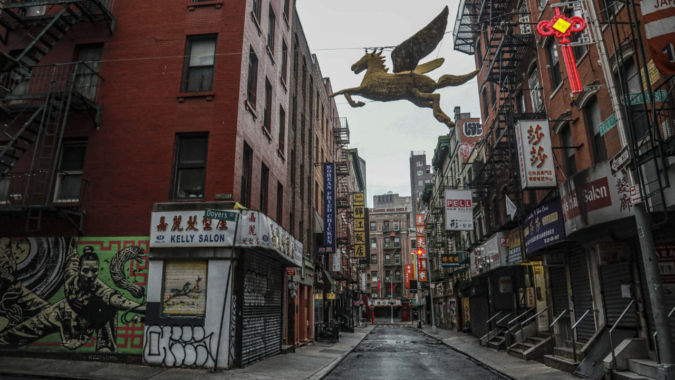China is believed to be operating dozens of secretive police outposts in countries around the globe.
Last year the Spain-based human rights group Safeguard Defenders first revealed the existence of such outposts. The group revealed that the “police stations” were involved in pressuring Chinese nationals to return home to face criminal charges.
Canada and several European governments have cracked down on similar unofficial “police stations”. US Justice Department officials, however, said the latest arrests were the first of their kind anywhere in the world.
The “police stations” often operate with little or no indication they are there — though US officials said the Manhattan office had been visited by officials from the Chinese consulate in New York.
Besides the arrest of “Harry” Lu Jianwang (61) and Chen Jinping (59) — both US citizens, about three dozen officers with China’s national police force have been charged with using social media to harass dissidents inside the United States, authorities said.
“This is a blatant violation of our national sovereignty,” Michael Driscoll, the head of New York’s FBI field office, said at a news conference announcing the cases.
‘Smear attack against China’
Reacting sharply to the development, China said “political manipulation” was behind the arrests of two men.
“China firmly opposes the US side’s slandering, smearing, engaging in political manipulation, and maliciously concocting the so-called transnational repression narrative,” foreign ministry spokesman Wang Wenbin told reporters.
“We urge the US to immediately reflect on itself, abandon Cold War thinking and ideological biases, immediately stop related erroneous practices, stop political manipulation, and stop smear attacks against China,” he added.
‘Sinister functions of the police station’
Though the secret police station did perform some basic services, such as helping Chinese citizens renew their Chinese driver’s licenses, it also served a more “sinister” function, including helping the Chinese government locate a pro-democracy activist of Chinese descent living in California.
The cases are part of a series of Justice Department prosecutions in recent years aimed at disrupting Chinese government efforts to locate in America pro-democracy activists and others who are openly critical of Beijing’s policies and to suppress their speech.
One of three cases announced on Monday concerns a local branch of the Chinese Ministry of Public Security that had operated inside an office building in Manhattan’s Chinatown neighborhood before closing last fall amid an FBI investigation.
The two men who were arrested were acting under the direction and control of a Chinese government official and deleted communication with that official from their phones after learning of the FBI’s probe in an apparent effort to obstruct the inquiry, according to the Justice Department.
At no point did the men register with the Justice Department as agents of a foreign government, US law enforcement officials said.
Transnational repression
Justice Department officials in recent years have prioritised prosecutions of what’s known as “transnational repression,” in which foreign governments work to identify, intimidate and silence dissidents in the US.
A signature case concerning China was announced in 2020, when the Justice Department charged more than a half-dozen people with working on behalf of the Chinese government in a pressure campaign aimed at coercing a New Jersey man wanted by Beijing into returning to China to face charges.
In January, the Justice Department charged three men in an alleged plot that originated in Iran to kill an Iranian American author and activist who has spoken out against human rights abuses there.
What are the Chinese ‘police stations’
China has reportedly established over 50 “overseas police stations” in around 30 countries in less than 6 years. While Beijing claims that the “volunteer-run service stations” are part of its efforts to crackdown on corruption, activists fear they are being used to track and harass dissidents.
The Chinese government has stated that the stations were established to provide Chinese nationals in foreign countries with bureaucratic assistance, such as document renewals, and to fight transnational crime, such as online fraud.
But a lack of transparency around the relationship between the centers and the Chinese government slowly attracted suspicion.
Safeguard Defenders has alleged that the stations are part of a programme to harass and coerce individuals wanted by the Chinese government, including dissidents, by threats to their families and themselves to head back to China to be detained.
It claimed that between April 2021 and July 2022, the Chinese government recorded 230,000 “suspects of fraud” who were “persuaded to return”. Additionally, the group claimed the stations violated the sovereignty of host countries by allowing Chinese police to circumvent police cooperation rules and procedures.
Last year, China’s embassy in Washington acknowledged the existence of volunteer-run sites in the US, but said they were not “police stations” or “police service centers”. “They assist overseas Chinese nationals who need help in accessing the online service platform to get their driving licenses renewed and receive physical check-ups for that purpose,” said embassy spokesman Liu Pengyu.
“They are not police personnel from China. The US side should stop the groundless hyping of this issue,” Liu said.
Under the guise of corruption crackdown
According to the report by Safeguard Defenders, China’s growing campaign to police Chinese nationals abroad has gone hand in hand with its expanded “anti-corruption” campaign domestically — a pet project of President Xi Jinping.
While it is known that lower value targets are often pursued via “persuaded to return” tactics, the report stated that Beijing’s Sky Net campaign – which includes operation Fox Hunt targeting higher value suspects – surpassed 10,000 successful returns by Christmas 2021, from 120 different countries.
It further stated many of these returned individuals had fled religious and/or ethnic persecution.
The establishment of the overseas police station has come as an addition to China’s surveillance and spying methods that the world has largely remained unaware of. China has a history of carrying out surveillance in Africa, and now it has expanded to other countries as well.
(With inputs from agencies)
